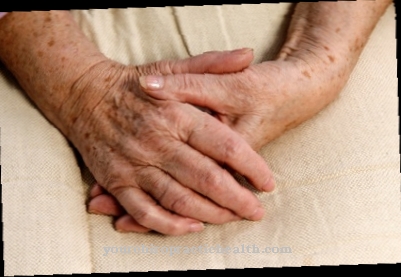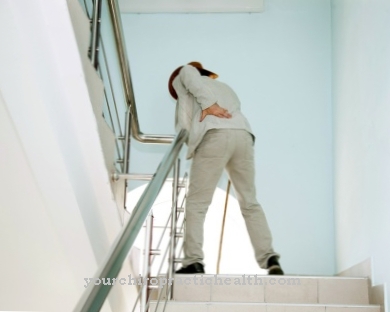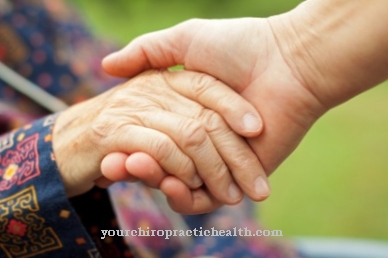Racing heart, Palpitations, fast pulse or (med .: Tachycardia) is a continuously accelerated pulse to over 90 beats per minute. From a pulse of 150 beats per minute, one speaks of pronounced tachycardia. As with rapid atrial fibrillation, signs of a racing heart are regular or irregular knocking or throbbing that can be felt up to the throat or the carotid artery. The causes of palpitations can be natural or pathological.
What is a racing heart?

A racing heart (med .: tachycardia) is an accelerated heartbeat in the chest. Some patients also describe it as a rapid pulse, which can be racing or pounding. It is not uncommon for those affected to feel this feeling down to the neck.
Tachycardia is medically determined only from a plus beat of more than 100 beats per minute. In the special form of the turf, the ventricular tachycardia, the cause comes directly from the ventricles. In this case, a doctor should be consulted quickly. There is also supraventricular tachycardia. This feels very uncomfortable for the patient, but is usually harmless in nature. Here the cause is to be localized above the heart chambers. Nevertheless, it is advisable to consult your family doctor or a cardiologist if you have a palpitations, regardless of the origin.
As a rule, palpitations are considered to be a symptom of another underlying disease. Sometimes it can also be a disease in itself. The most common reasons for palpitations, however, are mostly mundane body processes such as fear, stress, excitement and joy. But psychosomatic causes can also cause tachycardia.
causes
Palpitations of over 100 beats per minute are usually quite natural. This heart rate is reached quickly, especially during physical exertion and sport. The heart rate in small children can be over 100 even when at rest, without this being pathological.
In most cases, palpitations are harmless and occur when there is anticipation, excitement or stressful situations. However, after calming down, the palpitations disappear quickly.
Sometimes palpitations or a fast heartbeat can also be signs of a more extensive illness, which should be examined by a doctor in any case.
Heart diseases in particular, such as atrial fibrillation (see coronary heart disease), heart valve diseases, cardiac muscle diseases or cardiac arrhythmias often lead to palpitations and should definitely be clinically diagnosed and treated. Here the palpitations or palpitations are caused by the heart itself, e.g. through additional conduction pathways, other disorders in the excitation conduction system or through circulatory disorders in the heart muscle.
Thyroid diseases as well as caffeine, nicotine and medication can also trigger palpitations. Palpitations caused by an overactive thyroid act through hormones or neurotransmitters on the conduction system or the heart muscle. Other possible causes of palpitations are high blood pressure (hypertension), drop in blood pressure, hypoglycaemia and anemia (anemia).
A special case of palpitations can also be congenital or inherited tachycardia. This leads to a disturbed conduction in the heart and can be treated with an operation. Palpitations are also often observed in the course of anxiety disorders.
Palpitations or palpitations can also be accompanied by other symptoms. These include dizziness, palpitations, drowsiness, loss of consciousness, and speech and vision disorders.
You can find your medication here
➔ Medicines to strengthen the heart and circulatory systemDiseases with this symptom
- Coronary heart disease
- Heart attack
- Pulmonary embolism
- Ventricular fibrillation
- Heart failure
- Myocarditis
- heatstroke
- Sunstroke
- Anxiety disorder
- Fear of heights
- claustrophobia
- Dental phobia
- Hyperthyroidism
- Anemia
- high blood pressure
- Cardiac neurosis
- Menopause
- Blood poisoning
Diagnosis & course
The cause (s) of palpitations and a possible need for treatment are diagnosed by a specialist (e.g. a cardiologist) in various examination steps:
First of all, the doctor usually asks about the time of the first rapid heartbeat, possible triggering situations (e.g. stress), accompanying complaints, previous or underlying diseases (such as cardiac arrhythmias) and current medication intake.
Further examination steps then include blood draws, pulse and blood pressure measurements and, if necessary, EKGs (electrocardiograms), ultrasound examinations or x-rays.
Depending on the cause of the racing heart, the latter often occurs suddenly (often accompanied by dizziness / sweating). Physically caused palpitations usually increase steadily over time or persist, while psychological causes often manifest themselves in an intermittent palpitations.
Complications
Similar to diseases of the circulatory and respiratory tract, the racing heart also worsens as the disease progresses. Since the symptoms only go away on their own in rare cases, there is a deterioration in the general condition. In addition, there are often more serious problems that require the intervention of a doctor.
Failure to act in good time can lead to dizziness and sweating, a circulatory collapse or a heart attack. A physically induced racing heart is also accompanied by strong inner restlessness, caused by the chronically accelerated pulse and accompanying symptoms such as the well-known stinging in the heart and chest. Mentally caused palpitations occur in episodes, but also increase over time. The course is rarely fatal, but the fast beating heart and the symptoms that go with it limit the quality of life.
Fear attacks can be particularly stressful for those affected, which in turn promote the development of further diseases. With an early diagnosis, however, an accelerated pulse is easily treatable. The symptoms are usually due to more harmless causes and dietary measures and light medication can be treated. The course of a palpitations depends largely on when the symptoms are recognized and the underlying causes. There are rarely complications with the treatment itself.
When should you go to the doctor?

Palpitations as a symptom can have a harmless, but also very serious background. Exercise, physical activity, stress and excitement cause palpitations. After a while, it will go away by itself. There would only be an occasion for a doctor's visit if the racing heart occurs much earlier in such situations or lasts longer than usual.
Palpitations can also be due to an organic disease. An increased heart rate or a racing heart are called tachycardia. Medically, palpitations are defined from a beat frequency of 150 heartbeats per minute and up.
Some people naturally have a faster heartbeat. However, the racing heart is often based on an illness. Heart diseases such as coronary artery disease as well as diseases of the heart muscle or the heart valves can cause palpitations as well as a cardiac arrhythmia. Since the heart is the engine of life, palpitations should always be clarified by a doctor, provided that there is no trigger for this as mentioned above.
Apart from the heart itself, the cause of a palpitations can be due to another illness. In particular, high or low blood pressure, anemia, hypoglycaemia and an overactive thyroid are often accompanied by a racing heart. Palpitations can also be an effect of caffeine and nicotine consumption, as well as medication. Visual disturbances, dizziness, drowsiness and loss of consciousness can be symptoms of a racing heart and a reason to see a doctor.
| Dr. med. Nonnenmacher's checklist for your doctor's visit:
➞ Download the heartbeat checklist Please answer the following questions as comprehensively as possible. Also, write down any additional questions and then ask them to your doctor.
|
Doctors & therapists in your area
Treatment & Therapy
First of all, the doctor should find out whether it is harmless palpitations or whether the causes are disease-related. The doctor will try to find out why the heart is racing. In doing so, he explicitly addresses family stress and occupational stress and asks about potential previous illnesses and other complaints. He can also provide information on which medication is being taken and whether there are cardiac arrhythmias or heart stumbling.
Thereafter, blood is usually drawn, blood pressure and pulse measured. An electrocardiogram (EKG) is also done. If the causes of the palpitations become apparent or no precise diagnosis can be established, further examinations will be carried out. This includes long-term ECG, stress ECG, ultrasound examination as well as possible long-term blood pressure measurements and x-rays.
If the cause of the palpitations turns out to be treated. If psychological stress such as stress is the cause, relaxation measures and stress avoidance are recommended. Autogenic training is particularly promising here. Natural tranquilizers such as valerian can also have a supportive effect. However, they should always only be associated with combating stress and have been approved by the doctor. Smoking and drinking plenty of coffee should be stopped.
Atrial fibrillation and cardiac arrhythmias should be treated with medication. A pacemaker may also be advisable. If the thyroid is overactive, this should be treated to get rid of the palpitations.
Outlook & forecast
Benign palpitations can usually be influenced positively by the patient, otherwise drug treatment can provide a remedy. The administration of beta blockers has proven effective in the treatment of certain forms of tachycardia. The same applies to sclerotherapy using catheter ablation. If the racing heart is due to atrial fibrillation, the heartbeat can be slowed down with the help of beta blockers or antiarrhythmics. The increased risk of thrombosis is combated with anticoagulants.
If ventricular fibrillation is responsible for the racing heart, there is an acute danger to life. A defibrillator that sends out a strong electrical impulse or a punch on the chest can interrupt the hyperactive conduction and thus generate a slower heartbeat again. In these cases, the patient usually has to undergo a surgical procedure promptly.
If the psyche is the trigger for the racing heart, tranquilizers such as benzodiazepines can help, but they usually have to be taken for a long time. With the help of relaxation techniques such as yoga or autogenic training, the patient can learn to remain calm in exceptional emotional situations. He will then no longer react immediately with a racing heart in stressful situations.
You can find your medication here
➔ Medicines to strengthen the heart and circulatory systemprevention
Palpitations that are not caused by a disease can be prevented by a healthy, stress-free life with plenty of exercise, fresh air, a healthy diet and refraining from smoking and alcohol. Autogenic training is also preventative, as it not only serves to calm you down but can also bring more relaxation to everyday life. For some patients who suffer from psychosomatic symptoms such as palpitations, long-term use of valerian tincture has helped over the long term.
↳ More information: Home remedies for palpitations
You can do that yourself
If your heart has a sudden palpitations, a light massage on the neck can improve symptoms. With the index and middle fingers, those points on both sides of the neck are gently massaged where the pulse of the carotid artery can be felt.
The patient should sit or lie down because the massage can not only make the palpitations disappear, but also lower the blood pressure. During the process, the carotid sinus nerve on the internal carotid artery is stimulated, the pressure receptors of which are responsible for measuring the blood pressure in the artery. The increase in pressure sends electrical impulses to the brain, whereupon the circulatory system reacts by throttling the heart rate and dropping blood pressure.
It can also be helpful to hold your nose and mouth closed while exhaling. Medical professionals refer to this method as the Valsalva maneuver, researched by the Italian medical professional of the same name. This leads to strong tension in the respiratory and abdominal muscles as well as increased air pressure in the airways. The result is a lower blood volume in the right ventricle, which leads to a lower stroke volume. The procedure may only be carried out for ten seconds, otherwise there is a risk of circulatory collapse. However, a doctor should be consulted beforehand.
If the patient frequently complains of palpitations, it is advisable to avoid coffee and nicotine. In addition, stress should be avoided; instead, long walks in the great outdoors and, after consultation with the treating doctor, lots of sport and exercise are worthwhile.
| Tips:
No stress: The most common cause of palpitations is stress. Try to relax, go for a walk in the fresh air, or do moderate exercise such as jogging or weight training. Autogenic training, yoga and progressive muscle relaxation round off the anti-stress methods. No luxury foods: Refrain from coffee, caffeinated drinks and do not smoke. Avoid alcohol. Cold drink: Drink a cold sparkling water and then burp afterwards. This method is similar to the Valsalva maneuver and can contain the racing heart. Valsalva maneuvers: Hold your nose while closing your mouth. Then try to exhale slowly through your mouth. The resulting pressure in the chest slows the heartbeat and thus lowers the feeling of the heart racing. Massage the neck: Feel your pulse with two fingers on the carotid artery. The pulse can slow down by gently massaging the carotid sinus nerve there. Since blood pressure can also drop here, this exercise should be performed lying down after consulting a doctor. Deep breathing: Breathe in and out slowly. As is well known, this can give calmness and reduce palpitations. |












.jpg)



.jpg)










.jpg)
